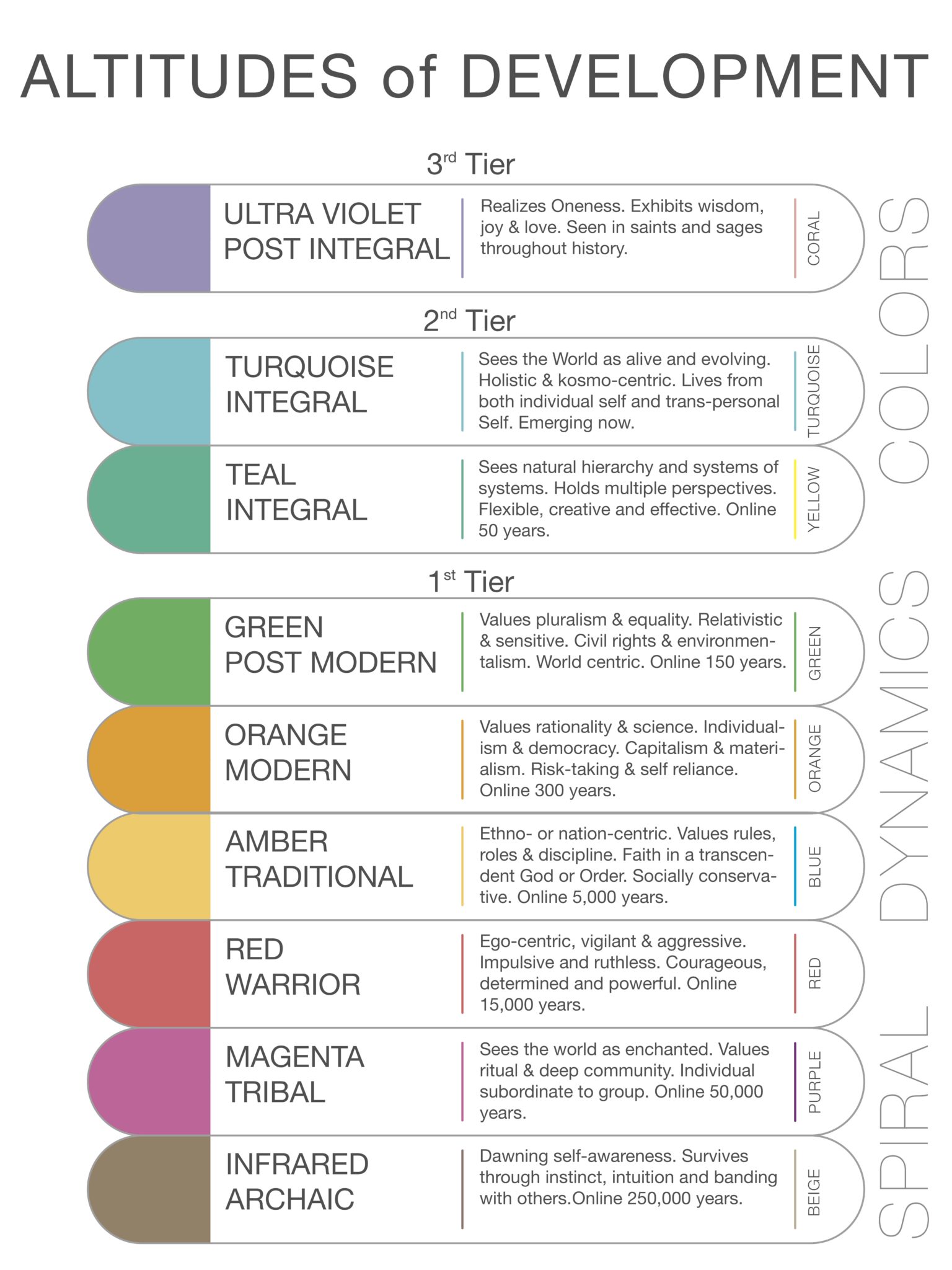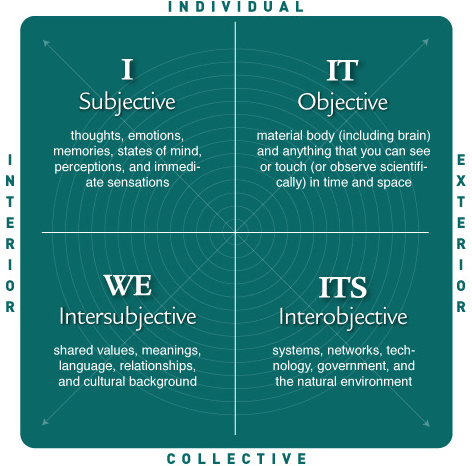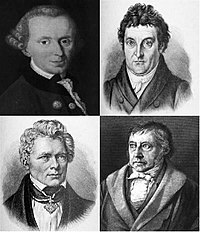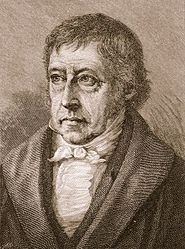Introduction to Integral Philosophy
by R.E. Slater
August 26, 2020
Integral Philosophy is not new. It began back in the 18th and 19th centuries by a group of philosophers and early scientists thinking through the concepts of the ideal and idealism (sic, German Idealism). One could even take Integral Philosophy all the way back to the beginning of philosophy itself when describing it as the love of wisdom. Millenia later Ayn Rand describes her laissez faire capitalism ideal as that which leads to personal happiness. Eastern religion seeks tranquility. Western religion emphasizes personal justice. As a whole, all humans would claim the unexamined life is impractical without the exertion of wisdom and love.
What intrigues me about Integral Philosophy (IP) is its centering in Whitehead's Process Philosophy as IP examines the developing consciousness (conscientiousness?) of postmodern societies struggling with social justice and environmental care. I have long thought, even as I do now, that the social development of religion and humanity is a very evolutionary thing (sic, E.O. Wilson's Eusociality in its comportments of social altruism and societal evolvement):
What is eusociality? Sociobiologist and biodiversity scientist E.O. Wilson's evolutionary epigenetic law is second only to Darwin's law of species adaptation to survive. It says that successful species will work together and even sacrifice itself to ensure the larger group's survival. This genetic trait is known as eusociality
Even though I sometimes wonder if we've progressed at all as human civilizations when comparing the evil of our times with the evil of the ancients. But overall, humanity's literature and art tell us that the soul of the human breast wrests beast with angel, dark with light, ever entangled in confusion between doing "what is best for itself" and "what is allowed without getting caught" (apologies, I'm being cynical here)... between "what is good for the self" and "what is good for others". Wilson's eucsociality says the struggle for personal survival may often submit to the higher struggle for the life of the community when tested.
We live in no less enlightened eras. And though I believe I could make a good case for the steady ethical evolution of civilizations over the years, integral philosophy apparently goes this same route along the lines of societal evolutionary development. It's yet another element a theologian may use when arguing for enlightening unwise generations travelling paths of death affecting not only their own self-involved, short-sighted personas but many the many generations after them.
Overall, Integral Philosophy is a way of embracing all the good out from the historical evolution of humanity and its societies. Certainly IP is concerned with the evolution of consciousness and what this means in relationship to the cosmos at large. But it is also concerned with the greater subject of societal ethics and virtures civilizations have experimented with over the centuries. Both within their citizenry and exterior to themselves in relation to other city and nation states.
Lastly, I'm not big on mysticism, New Ageism, and that sort of thing. I've mentioned this before as I wish to mention it again. Ken Wilber has grabbed hold of Integral Philosophy and seems to have advanced it towards this kind of direction. I left a Wikipedia article on Ken in my post here as well as several other opinions at the bottom of this post after Steve McIntosh's several reviews of IP. Should the Wilber's-of-the-world advance humanity towards love, peace and tranquility with one another than I'm just fine with their teachings.
Maybe not with the humanism of it as a Christian ethicist. But certainly in the sharing of wellbeing with one another I applaud any 'isms embracing humanity with humaneness. In fact, its not much dissimilar with my stand for-and-against Christianity. What is Christian's end results? Peace, Love, Wellbeing? Or War, Hate, and Division. If the latter than throw off this type of worthless religion as those who preach dogmas anathema to mankind's and this world's survival. God is a God of Love. Jesus is the way to inacting God's Love. Jesus' atonement gets us beyond our strifes, fears, and hates.
With that, let's look at what Tripp Fuller's Homebrewed Christianity site debated during the years of 2013-2015 to catch us up. Currently, in 2020, I'm following Matthew T. Segall as an updated version of anything related to Integral Philosophy. Whether Matt is a Christian or not I do not know. I'm still new to this relationship. But I respect him a lot. Matt seems to understand the nub of Christianity and utilizes Alfred North Whitehead's Process Philosophy as central to his understanding of Integral Philosophy. So these are all good beginnings.
Peace,
R.E. Slater
* * * * * * * * * *
Matthew David Segall – Science, Religion, Eco-Philosophy, Etheric Imagination, Psychedelic Eucharist, Ecological Crisis and more…
by Jesse Turri
February 24, 2015
 SegallI (Jesse) recently chatted with one of my favorite ecophilosophers, bloggers, and youtubers, Matthew David Segall.
SegallI (Jesse) recently chatted with one of my favorite ecophilosophers, bloggers, and youtubers, Matthew David Segall.
Matthew is a a doctoral candidate in philosophy and religion at the California Institute of Integral Studies in San Francisco, CA. His knowledge of the history of philosophy is expansive and the synthetic approach exemplified in his work is imperative and extremely valuable.
We cover a ton of topics including Matthew’s spiritual and philosophical influences/background, his transition from scientistic atheism to Buddhism to Western Esoteric Hermetic Christianity; his understanding of the relationship between science, philosophy and religion in the west; his interest in Carl Jung, Whitehead, Schelling, and esoteric thinker Rudolph Steiner and how they exhibit what Matt calls “etheric imagination.” We also talk about science and art, psychedelics, consciousnesses and Eucharist, capitalism and the ecological crisis and the talk he’ll be giving at the upcoming Whitehead conference in Claremont this summer.
* February 26th at the Level Ground Film Festival in Pasadena SoCal
* March 4th – Live Podcast w/ Doug Pagitt @the Loft in LA.
* March 13 & 14th at Villanova University, PA. The End of Religion? Faith in a Postmodern Age. Featuring Jeff Robbins, Merold Westphal, and John Caputo
* March 18th in Chicago – Theology Nerd Bootcamp w/ Tripp & Scott Paeth
* March 19-21st in Chicago at Progressive Youth Ministry Conference. EPIC live podcast on Friday night sponsored by our friends at Phillips Theological Seminary
PODCAST Between Tripp & Matt
* * * * * * * * * *
What Is Integral Philosophy?
by Steve McIntosh
February 9, 2013
Integral philosophy has been receiving a good deal of attention within the progressive Christian community recently. And because I’m both a “progressive follower of Jesus” and an integral philosopher, Tripp Fuller asked me to write a brief blog post on the subject to accompany the podcast discussion between he and I that will appear on the Home Brewed Christianity website. So what follows is a simplified description of the emerging integral perspective as I understand it.
Integral philosophy is a spiritual philosophy of evolution that emphasizes the evolution of consciousness and culture as a central factor in the process of evolution overall. Integral philosophy itself has evolved over the last century through the work of Henri Bergson, Alfred North Whitehead, Pierre Teilhard de Chardin, Ken Wilber, and others. This philosophy also draws on the discoveries of developmental psychology and other social sciences, and it has been influenced by related forms of social philosophy, such as the widely respected work of German philosopher Jürgen Habermas.
Although these founders of integral philosophy differ on many points, they have all recognized that a greater understanding of consciousness is the key to a more complete conception of reality.
While the concept of consciousness is easier to illustrate than define, a common sense definition of human consciousness includes a person’s thoughts, feelings, intentions, values, memories, and sense of self. Consciousness can be understood as the inside of human experience, what it is like to be and know ourselves; and this sentient personality, this original identity, is also the unique subjective presence through which others know us.
What makes integral philosophy compelling and important is its demonstration of the connection between the personal development of each person’s values and character, and the larger development of human history overall. Through its insights into the evolution of consciousness and culture, integral philosophy offers realistic and pragmatic solutions to the growing global problems that are increasingly threatening human civilization. That is, from the perspective of this philosophy, every problem in the world can be understood, at least partially, as a problem of consciousness:
...It follows that the solutions to seemingly intractable problems, such as environmental degradation and climate change, nuclear proliferation and terrorism, hunger and overpopulation, unregulated globalization and gross inequality, can all be effectively ameliorated by raising or changing the consciousness that is continuing to create (or failing to prevent) these problems.
Human consciousness can evolve in a wide variety of ways. It can be raised or evolved by increasing empathy and compassion, by cultivating knowledge, understanding and forgiveness, and by building political will and the determination to achieve social and environmental justice. Consciousness can also be raised by enlarging people’s estimates of their own self-interest, by expanding their notions of what constitutes “the good life,” and by persuading them to appreciate new forms of beauty and truth. The developed world’s relatively recent acceptance of women as the social equals of men provides a good example of how the human condition can be improved through the evolution of consciousness.
According to integral philosophy, however, the evolution of consciousness is largely dependent on the evolution of human culture. When humans evolve their culture through new agreements or new forms of organization, this results in a corresponding growth in human consciousness. Through the “network effect” of cultural transmission, when one person has a conceptual breakthrough or new realization, this advance can be shared with others. And as new discoveries or new skills are adopted within a larger cultural context, such advances become refined and reinforced. Consciousness and culture—the individual and the group—thus co-evolve together.
This understanding of the co-evolution of consciousness and culture leads to another central tenet of integral philosophy, which recognizes the sequential emergence of values-based stages of human cultural development. That is, integral philosophy’s view of cultural evolution sees history as unfolding according to a clearly identifiable developmental logic or cross-cultural pattern that influences the growth of human society. This developmental logic need not be construed as a “deterministic law of history,” or as implying a strictly unidirectional course of cultural development, but it does reveal a recurring theme in humanity’s narrative story. The unfolding of this theme or pattern results in a dialectical structure of conflict and resolution, which is created by the interaction of specific worldview stages or levels of historical development.
Integral philosophy’s insights into the evolution of consciousness and culture may be of particular interest to progressive Christians because of the light this new perspective sheds on the unique historical challenges now faced by Christianity. Tripp and I begin to unpack the relevance of integral thinking for progressive Christianity in the podcast that will accompany this blog (in the next 2 weeks), and I hope we will be able to continue our discussion in the time ahead.
---
STEVE MCINTOSH J.D. is a leader in the integral philosophy movement and author of the new book, Evolution’s Purpose, as well as the acclaimed 2007 book, Integral Consciousness. He is also a co-founder of the new think tank: The Institute for Cultural Evolution. In addition to the think tank and his work in philosophy, McIntosh has had a variety of other successful careers, including founding the consumer products company Now & Zen, practicing law with one of America’s largest firms, working as an executive with Celestial Seasonings Tea Company, and Olympic-class bicycle racing. He is a graduate of the University of Virginia Law School and the University of Southern California Business School, and now lives in Boulder, Colorado with his wife and two sons. For more on his work, visit: www.stevemcintosh.com
* * * * * * * * * *
Is Integral Theory New Age?
On the Credibility of Integral Philosophy:
a Response to Tony Jones’ Blog
by Steve McIntosh
March 4, 2013
This is my second “guest blog” here on Homebrewed Christianity. The first one, titled: “What Is Integral Philosophy?”, drew a response from Emergent Church thought leader Tony Jones, over at the Patheos website, titled: “Why Does Integral Philosophy Sound Like New Age?”. I was not aware of this until Tripp Fuller alerted me to Tony’s blog, and in connection with Tuesday’s podcast interview on Homebrew, Tripp invited me to respond with the following.
First, let me say that I’m glad my blog got Tony’s attention. My purpose in making media with Tripp is to help cross-pollinate the integral and emergent movements because there is a lot of overlap and I think we are natural allies. As a follower of Jesus myself, I’m reaching out to progressive Christians because I know it is easy to get the wrong impression about the credibility and usefulness of integral philosophy, and I want to correct that. In my books I draw heavily from the work of Philip Clayton, Holmes Rolston III, John Haught, David Ray Griffin, and of course, Whitehead and Teilhard. And I’ve found that the main difference between the integral perspective and progressive Christian theology is integral’s focus on the evolution of consciousness and culture. Building on progressive Christian theology in my latest book, Evolution’s Purpose: An Integral Interpretation of the Scientific Story of Our Origins, I contend that this distinctive integral understanding of the evolution of consciousness can in fact be established through academically credible arguments (the book was endorsed by Rolston and Haught).
Second, I agree with Tony that the convoluted chart at the top of his blog post does not help our cause. However, in addition to being a form of philosophy, integral is also a popular movement. And those who have sought to popularize the integral perspective have often times schlocked it up. As I argue in the podcast with Tripp, the teachings that make integral interesting and accessible to a popular audience are the same ones that over-simplify it and make it seem more like pop psychology than serious thinking.
Ken Wilber, however, is another matter. I am not a “fanboy” of Wilber (using Tony’s phrase), but my work is certainly indebted to many of Wilber’s insights. Wilber is a complicated figure because he is both a philosopher and a spiritual teacher. And in my 2007 book, Integral Consciousness and the Future of Evolution, I critique Wilber for failing to distinguish integral philosophy from his Vedanta/Vajrayana belief system, and for playing fast and loose with the serious scholarship of others. Although I identify myself as an “integral philosopher,” I don’t consider myself a “Wilberian.” Integral Consciousness includes a chapter on “The Founders of Integral Philosophy,” which makes clear that Wilber is part of a line of integral thinkers who have all sought to understand the spiritual implications of evolution.
So is integral philosophy “New Age”? This, of course, is a term of derision (a term that has also been applied to the emergent church movement as I recall). A less pejorative term would be “progressive spirituality.” And progressive spirituality certainly has its lowbrow and tawdry elements; but of course so does Christianity. The progressive spiritual milieu, however, also includes intellectually respectable figures, including nominal Christians like Thomas Berry and Matthew fox.
The integral perspective may appear to casual observers to be a form of progressive spirituality because it has emerged out of this culture. But integral philosophy pushes off against and attempts to transcend the abundant shortcomings of progressive spirituality. And in my attempt to do just this in my writing, I’ve found the work of Clayton and the other contemporary theologian/philosophers mentioned above to be very helpful.
Tony writes that he has avoided looking into integral philosophy because of its lack of academic recognition. Yet even though there are a number of professional academics actively working to improve integral’s image in academia, I do not expect these efforts to bear much fruit in the near term. In my humble opinion, mainstream academic philosophy is largely in default regarding its duty to society. It’s been culturally irrelevant for decades, and has become so cramped and pinched that it is now only of interest to narrow specialists.
This same situation prevailed at the beginning of the Enlightenment, when the academic philosophy of the time (Scholastic Aristotelianism) had become stale and irrelevant as a result of its becoming the handmaiden of religion. Early Enlightenment philosophy was not only ignored or disfavored, it was illegal—Spinoza had to flee Amsterdam in the middle of the night to avoid being arrested for his writing. And now, most of academic philosophy has become similarly stale; this time as a result of becoming the handmaiden of science. The reactionary scorn heaped on atheist philosopher Thomas Nagel’s recent book, Mind and Cosmos: Why the Materialist Neo-Darwinian Conception of Nature Is Almost Certainly False, provides a good example.
Thus it should come as no surprise that unorthodox forms of philosophy are emerging now to try to move forward in ways that are otherwise blocked by the materialistic prejudices of the academy. So even though most of us integral writers strive for intellectual rigor in our scholarship, we do not expect mainstream academia to validate our transcendence of their way of thinking. When it comes to entrenched identities, even the best argumentation is not persuasive.
To conclude, regardless of our limited prospects within mainstream academia, I do hope to persuade Tony and others in the emergent church movement that integral is worthy of more than a “drive-by dismissal.” Admittedly, a full-throated defense of integral philosophy cannot be adequately accomplished in a short blog post, or even an hour’s podcast, and I suspect my upcoming interview with Tripp will raise additional questions and objections. But hopefully it will at least pique your interest. And if it does, I invite you to visit my website and check out my books. Once you give it a fair hearing, I trust you will agree that this new way of seeing can be highly useful for our mutual work of furthering the progress of spirituality in general, and the teachings of Jesus in particular.
* * * * * * * * * *
God, Integral Philosophy, Non-Dual thinking and Spiral Dynamics w/ Steve McIntosh
by Tripp Fuller
October 25, 2015
It is time to discuss a robust affirmation of God in conversation with non-dual thinking, spiral dynamics and integral philosophy. Steve McIntosh is back on the podcast for the fun. We discuss his new book The Beauty of the Infinite and after you hear this conversation I suggest you get your ‘click’ on and get the book headed your way.
If you are down for some fun consider joining Steve and me at Enfolding Spirituality conference here in Redondo Beach, along with Don Beck, Rob Bell and plenty of others.
Steve McIntosh is a leader in the integral philosophy movement and author of the new book on spiritual experience: The Presence of the Infinite (Quest 2015). Steve is also author of Evolution’s Purpose (SelectBooks 2012), and Integral Consciousness and the Future (Paragon House 2007).
He currently works as President and Co-Founder of the nonprofit social policy organization: The Institute for Cultural Evolution. In addition to this think tank, and his work in philosophy, McIntosh has had a variety of other successful careers, including founding the consumer products company Now & Zen, practicing law with one of America’s largest firms, working as an executive with Celestial Seasonings Tea Company, and Olympic-class bicycle racing. He is an honors graduate of the University of Virginia Law School and the University of Southern California Business School, and now lives in Boulder, Colorado with his wife and two sons.
PODCAST Between Tripp & Steve
* * * * * * * * * *
What Is Integral Theory | An Introduction
by Todd J. Schmenk, LMHC
Dec 1, 2017
What is Integral Theory and how is it useful?
This video is a brief introduction and overview
of the theory and its usefulness in everyday life.
* * * * * * * * * *
A QUICK INTRO TO INTEGRAL THEORY
ALTITUDES OF DEVELOPMENT & QUADRANTS OF REALITY
BASED ON KEN WILBER’S AQAL THEORY
Click the image to enlarge.
Integral theory is a school of philosophy that seeks to integrate all of human wisdom into a new, emergent worldview that is able to accommodate the gifts of all previous worldviews, including those which have been historically at odds: science and religion, Eastern and Western schools of thought, and pre-modern, modern and post-modern worldviews.
Integral theory builds on the foundations of evolutionary theory. Evolution is well established by science and is non-controversial for anyone with a modern or post-modern worldview. We know from ever-more sophisticated observation and analyses that the cosmos burst into being about 13.8 billion years ago, first as energy then as matter, arising as atoms and molecules that formed the heavenly bodies, including our home planet, Earth.
On Earth we know that molecular evolution continued, creating cells (life!) then organisms which grew in complexity, from amoebae to sponges to fish to reptiles to mammals, culminating in the human being, the most complex entity in the known universe.
The whole process of evolution is accelerating exponentially: if all of known time is seen as a 24-hour day, life showed up in the last three hours, mammals in the last three minutes, and human beings in the last 1.5 seconds. The pyramids were built .07 seconds ago and Hey Jude was written .0007 seconds ago.
Integral theory posits that evolution is not limited to the exterior forms of reality (matter and organisms), but is also evident in the interior spaces of reality, namely in the development of culture and consciousness.
An integral view of history maintains that the collective consciousness of the human race has evolved through pre-modern, modern and post-modern structures, and is emerging into a new structure of consciousness, the integral stage, which is characterized by an ability to think and act from multiple worldviews.
EXCERPTS FROM A VIDEO SERIES ON THE BASICS OF INTEGRAL THEORY
Here are some excerpts from a series of videos I was invited to create with Nomali Perera and Lee Mason of Practical Integral. Enjoy the short clips and I encourage you to watch the full videos here.






